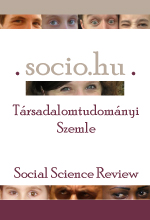Az iskolai teljesítményt és előmenetelt hátrányosan befolyásoló tényezők megítélése a szociális szakemberek nézőpontjából
The assessment of factors influencing school advancement by professionals working in the social sphere
Author(s): Márta Kiss, Zoltán VastaghSubject(s): Sociology of Education
Published by: MTA TK Szociológiai Intézet
Keywords: school disadvantages; compensation of disadvantages; professionals working in the social sector; problem detection; dimensions of school efficiency; school performance and career; student efficiency
Summary/Abstract: In the study we examine the opinion of professionals working in the social sector about the factors influencing children’s school performance and development, as well as the reasons for disadvantages in this field. The reason for this approach and choice of target group is, firstly, that while teachers’ opinions are better known from previous research, professionals working in the social areas, despite having to work together with teachers, are not usually asked about this topic. Secondly, under recent government directives and regulations, the initiatives established to counteract extracurricular (out of school) disadvantage like After school support programmes (Tanoda), Sure Start Children Centres, and social workers in schools and nurseries, have become part of the child welfare and protection system or have come under its professional supervision. Our research – being a pilot project – was carried out among social professionals in Baranya, and identified eight problem areas (latent factors) regarding the causes of disadvantages. Based on the averages of the opinions of the interviewed professionals, the majority standpoint is that disadvantages arise first and foremost from parental patterns and behaviours, the child’s attitude to learning, and the lack of social competencies. These results are consistent with a survey made among teachers, where respondents also identified the attitudes of parents and children as the most important influencing factors. At the same time, cluster analysis revealed that the interviewed professionals are not uniform in this respect (either): three different groups, characterized by markedly different opinions, can be identified among them.
Journal: Socio.hu Társadalomtudományi Szemle
- Issue Year: 10/2020
- Issue No: 1
- Page Range: 45-73
- Page Count: 29
- Language: Hungarian

